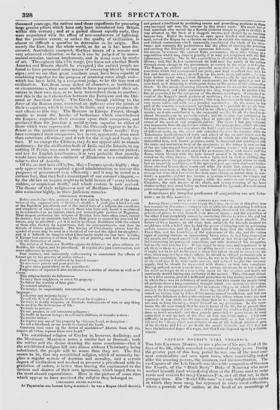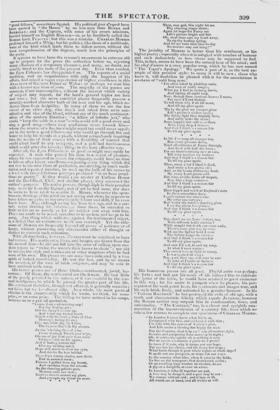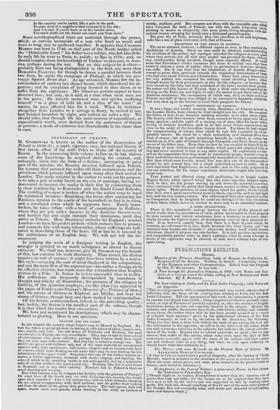CAPTAIN MORRIS'S LYRA URItANICA.
Tun Into Cuani.ns Moanis, to use a phrase of his age, lived all time days of his life, which extended to upwards of ninety years. Dunes the greater part of this long period he was one of the most emi- nent convivialists and men upon town, when conviviality tasked alike the amusing powers, the manners, and the constitution. The ex-Captain of the Life Guards was the table companion of Grottos the Fourth, of the " Black Surry" Duke of Nonvor.a who never washed himself, (and when dining alone at the Piazza used to order turtle and venison for beta) Cnannes Eta, and all that set, in their younger days. his " Social Effusions" not only delighted the tables at which they were sung, but appeared in every vocal collection; where a portrait of the author, at the head of an assemblage of
••••
" good fellows," sometimes figured. His political jeux d'c.sprit have been quoted in " the House" by no less men than BURKE and Stiatunais ; and the Captain, with some of his sworn admirers, fancied himself an English Honace—or, as he familiarly called the Roman bard, Fravecus : but this was a mistake. CHARLES 'Mourns professed himself' a Whig; but his politics, like those of a multitude, were of the kind which leads them to follow names, without the least comprehension of the dogmas, much less the principles of the party.
It appears to have been the veteran s amusement in extreme old age to prepare for the press the collection betbre us, rejecting want' clibsions of a temporary character, and many, no doubt, not exactly fitted to the taste of the present day. Even thus weeded,
the Lyra Urbaidect has disappointed us. The reports of a social tradition, and an acquaintance with only the happiest of his efforts, had raised a vogue expectation of higher excellence in this AxAmmos of GnolionPrince of Wales : or perhaps we scan him with a keener eye than of yore. The majority of the poems are common, if not commonplace, without the interest which variety of subject may impart, for the bard's general topics are love and wine ; but the more convivial pieces frequently possess a strongly-marked character both of the man and his age, which re- deems them front insipidity. In many of them we see the bon rirant of an cider day, who drink and raked front mere con- stitution and vice of the blood, without any of the mock sentiment- alism of the modern libertine : " a fellow of infinite jest," who could " keep the table in a roar "—who could tell a good story and sing a good song--whose easy confidence never forsook him— whom the reserve of a fine taste might repel but could never appal; yet in the main a good fellow—out: who would go through fire and water to help his friends at a piaci), without scrupulously inquiring into the merits of their cause ; with a flexibility of manner that could adapt itself to any coal:any, and a poll: hed flacetiousuess which could utter the broader t things in the least offensive way.
After all, the L1ru Urbasica is as good as might reasonably be
expected. A man who passed his time in a round of pleasure, where he was expected to amuse the company, could have no time to labour after latent excellence—rejecting et cry thing which did not rise to his own ideas of perfection, and strit ing, by much medi- tation and repeat; d boodles, to \roil; up the bulk of his verses to a level with tho.e fylicitous rLs-,n2„-cs produced " in an hour propi. tious to poetry." if they would l ass muster at Carlton "louse and the Beef-Steak Club, and similar places, they answered the author's purlo His native powers, though iligh in their peculiar way, were far fv,.m the highest ; and of art he had none, nor does he seem to live triad to acquire it. hence, whenever the spoil- Mucous dor:jags c.f his mind are not strong and clear, lie appears to have taken no I-aim; to improve them by labour and skill, if he even knew how. Nov. although owing Id; fame to stAigs, and in a cer- tain sense drawing his :,tub,,istc...e from them, he attended so little to his art as mostly to LI his subject run away with him. Plays are made to be acted, speeches to be spoken, and songs to be sung. Any thing which militates against the finidainental object, is a defect that no extraneous merit can ciatweigh. Yet the effu- sions of 3Ioanis are frequently beyond all power of patience or of lungs, without possessing any excellencies either of thought or diction to w area tut such extension.
With ail drawbecks, Levet or, Monnis must be admitted to have had nature. Ilis sentiments, ideas, and iniages, are drawn from the life around him—he did not fiat into the error of callin?- upon mo- dern topers to "twice the wreath their brows to shade " ; nor did he realm tile style and sentiments of other songsters when he had none aids own. Ilis pieces too are sena times animated by a true spirit of lyrical conviviality. lie was the last, and by no means the meanest, of the rave of table songsters, and may be said to have outlived table song. his better proms are a thrco kinds,—sentimental, jovial, hu-
morous. Of these, the st utb..contal are the kwest. Ile had little of the partly pocicz,.1 in Lis nature, or it was overlaid by the sen- sual ume in which he passed the neater part of his His scutin,cnt the!.4.,re, thoth not afreetc7l, is generally Maudlin; not fidte, but sic- k-----almost silly. As a whole, his most poetical etrusion is the Anacrci,ntic which he wrote, we think, lig some prize, or on some prize. The flailing we have noticed in his songs,
induces us to a panial quotation. "Come, thou 0 )0-reviving cup!
Try thy tooling art ; Stir the tamy's I lslons And warm lily wasted heart.
Touch with fre,ladzi:..2; tints of bliss Meniory.:‘ lame dream; Giro me, while thy lip I kiss, The heaven aid's in thy stream. As the 'wholinig fires of wine i'brce ti.rongh Time's mist reign, Gleams of jay that once were mine Glimpse back on BIZ. again; :lint if boding terrors rise
Oct' my melting mind,
Hope still starts to clear my eyes,
And drinks the tear behind.
Then We's wintry shades, new drest,
Fair as summer seem ;
Flowers I gather from my breast, And sunshine from the stream. As the cheering goblets pass,
Memory cults her store;
Scatters swats around my glass, And L roonipts my thirst Mr more. Then, rosy god, this night let me Thy cheering magic share; Again let hope-fed Fancy see Life's picture bright and fair.
Oh, steal from care my heart away,
To sip thy healing spring,
And let me taste that bliss to-day
To-morrow may not bring!"
The joviality of Molten is better than his sentiment, or his higher poetry; especially when it is mingled with touches of humour
and such melancholy as bons limns may be supposed to feel.
This, in fact, seems to have been the natural bent of' his mind; and
his cliff- d'oeuvre is a once popular song, which he has now named
" The Toper's Apology." We quote a part of it, as the best ex- ample of this peculiar style: to many it will be new ; those who know it, will doubtless be pleased with it fbr the associations it awakens of "auld lang sync.'
"I'm often asked by plodding souls,
And men of crafty tongue,
What joy I fund in draining bowls,
And tipling all night long.
Now, though these cautious knaves I scorn,
For once I'll not disdain
To tell them why I sit till morn,
And till my glass again.
'Tis by the glow my bumper gives Life's picture's mellow made;
The fading light then brightly lives, And softly sinks the shade;
Some happier tint Mill rises there With every (hop 1 drain— And that I think 's a reason fair
To till my glass again. * * * *
In life I've rung all changes too,
Run every pleasure dow Tried all extremes of Fancy through, And lived with half the town ; For me there's nothing new or rare, Till time d(Cel ems my brain—
And that I think's a reason fair To till my glass again.
Then, many a lad I liked is dead, And many a lass grown old ; And. as the lesson strikes my head, My weary heart grows cold.
But wine, awhile, holds Mr despair, Nay, bids a hope remain— And that 1 think's a reason fair
To till my glass again.
Then hipp'd and vex'd at England's state In these convulsive days,
I can't endure the ruin'ti fate My sober eye surveys; But 'midst the bottle's dazzling glare I see the gloom less plain— And that I think's a reason fair
To fill my glass again.
« * *
Nay. don't we see Love's fetters, too,
With different holds entwine ?
While nought but death can some undo, There's some give way to wine. With me the lighter head I wear
The lighter hangs the chain—
And that I think 's a reason fair Tu till any glass again.
And now I'll tell, to end may song, At what 1 must repine;
This cursed war, or right or %%Tong,
Is war against all It ine. ; Nay, port, they say, will soon be rare
.As juice of France or Spain— And that I think's a reason fidr To till my glass again.'
his humorous poems are all good. Playful satire was perhaps his forte ; and had not his mode of life induced him to cultivate the lanes of the table, lie would have attained to great eminence in this way ; fur his satire is pungent when he pleases, his per- ception of the weak point keen, his sentiments and images true, and his style brisk, lively, and animated by a genuine humour. In his
"veteran Bacchanal" he has portrayed the evils of old age, with a
truth and characteristic felicity which equals JUVENAL, however the Roman satirist may surpass hint in condensation, force, and universality. " The Contrast," too, is a clever and sprightly elm- 'iteration of the inconveniences of a country Mb; from which we
take a few stanzas to complete.our specimens of CHARLES Mounts.
" In London I never know what I'd be at, Enraptured with this, and midi:mica nitlt that ; I'm wild with the sweets of Variet■'s plan, And Life seems a blosing too happy for man.
But the Country, Cod help me! sets all matters right,
So calm and composing from morning to night ;
Oh, it settles the spirits wILtu nothing is seen
Butt an ass on a common, a goose on a green!
In town it it rain, why it damps not our hope, The eve has her choice, and the fancy her scope ;
What harm thoiagli it pour whole nights or whole days?
It spoils not our prospects, or stops not our ways.
In the country what bliss, when it rains in the fields, To live on the transports that shuttlecock yields ; Or go crawling from window to window, to see
A pig on a dunghill, or crow on a tree.
In Loudon, it Milts ill together are put,
A tore may be dropp'd, and a quiz may be cut :
We change without end ; and if lazy or ill,
All wants arc at band, and all wishes at will.
In the country you're nailed, like a pale in the park,
To some stick of a neighbour that's emmln'd in the ark;
And 't is aids if you're hurt, or in fits tumble down,
You reach death ere the doctor can reach you from town."
Some autobiographical hints are scattered through the poems, which, as curious memorials of a man who lived so much and lived so long, may be gathered together. It appears that CHARLES MORRIS was born in 1740, on that part of the North border called the " Debateable Land :" his father was a soldier, who left him little. In early life he went to Paris, to polish ; to Spa in 1778; and, we should imagine, from his knowledge of Yankee weaknesses, to Ame- rica, perhaps during the war. But on this subject he is silent— probably from not being distinguished in the field, any more than HORATIUS FLACCUS ; for though he draws a parallel between their two lives, he omits the campaign of Philippi, in which his pro- totype figured Bruto duce. As age advanced, MORRIS felt the in- convenience of modern late dinner-hours, which disordered his di- gestion ; and he complains of being doomed to dine alone, or to suffer from the nightmare. His bibacious powers appear to have deserted him ; but only, be it said, at a time when most men are in the grave. Ile latterly eschewed wine and spirits, confining himself " to a glass of mild ale and a slice of the roast :" an excess, he says, affected him for a week. When he withdrew altogether from London to a cottage in Surry, he retired at ten, had finished breakfast by eight, and walked six miles a day. We should infer, that through life his main sources of expenditure, or expenditure's worth, were derived from the assistance of friends or patrons; a mode of existence less discreditable in his times than in ours.




























 Previous page
Previous page